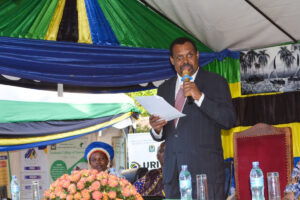Mr Sadati Musa, director of financial sector supervision at the Bank of Tanzania (BoT), who attended the inauguration of the first Islamic bond issued by KCB Bank Tanzania, stated that banks play an important role in facilitating private sector financing and stimulating economic activity.The bond, dubbed “KCB Fursa Sukuk,” is Sharia-compliant and aims to raise Sh10 billion to fund the lender’s Islamic banking portfolio.
Mr Musa said banks have a key role in facilitating the financing of the private sector and stimulating economic activity within a country. “Products like Sukuk support the government’s efforts in growing the economy. “I would encourage banks to improve their service delivery, which can be done by increasing creativity, such as using technology and expanding services even to rural areas,” said Mr. Musa, who was speaking on behalf of central bank governor Prof Florens Luoga.
Mr Nicodemus Mkama, CEO of the Capital Markets and Securities Authority (CMSA), stated that having multiple products in the financial markets facilitated market expansion and aided in investment and business growth.”It is also part of the CMSA’s five-year strategic plan, which aims to increase the number of capital markets products and facilitate the appropriate use of opportunities to promote socioeconomic development,” he added.
According to KCB Bank Tanzania’s managing director, Cosmas Kimario, the bank’s first public Islamic bond, which started yesterday (November 9 this year), will be closed on December 5 next month.
“While the minimum initiation investments will start at Sh500,000, the expected return will be 8.75 percent per annum, paid quarterly,” said Mr Kimario, adding that after the initial offering, the Sukuk will be listed on the Dar es Salaam Stock Exchange (DSE). The Fursa Sukuk is endorsed by the Shariah advisory board of the Center for Islamic Finance, Compliance, and Advice (CIFCA) and by the independent Shariah advisory board of KCB Sahl Banking, the bank said.
Share this news
This Year’s Most Read News Stories

‘No Marburg Confirmed In Tanzania’, But Mpox Remains ‘Public Health Emergency’

Monrovia — The Director General of the African Centers for Disease Control, Jean Kaseya, has said the center stands ready to support Tanzania and other countries in the region where suspected cases of the infectious Marburg Virus Disease have been identified. The World Health Organization earlier this week issued an alert warning of a possible outbreak in the country, although the Tanzanian Health Ministry has said tests conducted on available samples did not show the existence of Marburg in the East African nation.
“As of the 15 of January 2025, laboratory results from all suspected individuals were negative for Marburg Virus,” Tanzanian Health Minister Jenista Mhagama said in a statement. This would have marked the country’s second experience with the highly infectious disease that recently killed over a dozen people in neighboring Rwanda. Tanzania previously reported an outbreak of Marburg in 2023 in the Kegara region, said to have been the epicenter of the new suspected cases.
At the Africa CDC online briefing on Thursday, Kaseya also said another infectious disease, Mpox, “remains a public health concern”. He said that while in December 2024, the disease had afflicted 20 countries, a new country – Sierra Leone – has been added to the number after recent outbreak there. Sierra Leonean health authorities said on January 10 that two cases of Mpox had been confirmed in the country and dozens of contacts are being traced.
With thousands of confirmed cases of Mpox across Africa and more than 1000 people having died of the disease – mainly in Central Africa – Kaseya emphasized the need to increase testing, a theme he’s heralded before. The Africa CDC boss said over the next few months the continental health watchdog will deploy additional epidemiologists and community health workers to areas considered hot spots of infectious diseases in the region.
Source: allafrica.com

Tanzania Confirms Second Marburg Outbreak After WHO Chief Visit
Dar es Salaam — Tanzania’s President Samia Suluhu Hassan has declared an outbreak of Marburg virus, confirming a single case in the northwestern region of Kagera after a meeting with WHO director-general Tedros Adhanom Ghebreyesus.
The confirmation follows days of speculation about a possible outbreak in the region, after the WHO reported a number of deaths suspected to be linked to the highly infectious disease.
While Tanzania’s Ministry of Health declared last week that all suspected cases had tested negative for Marburg, the WHO called for additional testing at international reference laboratories.
“We never know when an outbreak might occur in a neighbouring nation. So we ensure infection prevention control assessments at every point of care as routine as a morning greeting at our workplaces.”Amelia Clemence, public health researcher
Subsequent laboratory tests conducted at Kagera’s Kabaile Mobile Laboratory and confirmed in Dar es Salaam identified one positive case, while 25 other suspected cases tested negative, the president told a press conference in Dodoma, in the east of the country today (Monday).
“The epicentre has now shifted to Biharamulo district of Kagera,” she told the press conference, distinguishing this outbreak from the previous one centred in Bukoba district.
Tedros said the WHO would release US$3 million from its emergencies contingency fund to support efforts to contain the outbreak.
Health authorities stepped up surveillance and deployed emergency response teams after the WHO raised the alarm about nine suspected cases in the region, including eight deaths.
The suspected cases displayed symptoms consistent with Marburg infection, including headache, high fever, diarrhoea, and haemorrhagic complications, according to the WHO’s alert to member countries on 14 January. The organisation noted a case fatality rate of 89 per cent among the suspected cases.
“We appreciate the swift attention accorded by the WHO,” Hassan said.
She said her administration immediately investigated the WHO’s alert.
“The government took several measures, including the investigation of suspected individuals and the deployment of emergency response teams,” she added.
Cross-border transmission
The emergence of this case in a region that experienced Tanzania’s first-ever Marburg outbreak in March 2023 has raised concerns about cross-border transmission, particularly following Rwanda’s recent outbreak that infected 66 people and killed 15 before being declared over in December 2024.
The situation is particularly critical given Kagera’s position as a transport hub connecting four East African nations.
Amelia Clemence, a public health researcher working in the region, says constant vigilance is required.
“We never know when an outbreak might occur in a neighbouring nation. So we ensure infection prevention control assessments at every point of care as routine as a morning greeting at our workplaces.”
The Kagera region’s ecosystem, home to fruit bats that serve as natural reservoirs for the Marburg virus, adds another layer of complexity to disease surveillance efforts.
The virus, closely related to Ebola, spreads through contact with bodily fluids and can cause severe haemorrhagic fever.
Transparency urged
Elizabeth Sanga, shadow minister of health for Tanzania’s ACT Wazalendo opposition party, says greater transparency would help guide public health measures.

Sign up for free AllAfrica Newsletters
Get the latest in African news delivered straight to your inbox
“This could have helped to guide those who are traveling to the affected region to be more vigilant and prevent the risk of further spread,” she said.
WHO regional director for Africa Matshidiso Moeti says early notification of investigation outcomes is important.
“We stand ready to support the government in its efforts to investigate and ensure that measures are in place for an effective and rapid response,” she said, noting that existing national capacities built from previous health emergencies could be quickly mobilised.
The situation coincides with leadership changes in Tanzania’s Ministry of Health, with both the chief medical officer and permanent secretary being replaced.
This piece was produced by SciDev.Net’s Sub-Saharan Africa English desk.
Source: allafrica.com

Karume faults lease of Zanzibar Islets
Diplomat Ali Karume has faulted the decision by the revolutionary government of Zanzibar to lease the islets that surround the islands of Unguja and Pemba to private developers saying it was absolutely not in Zanzibar’s national interests.Continue Reading











